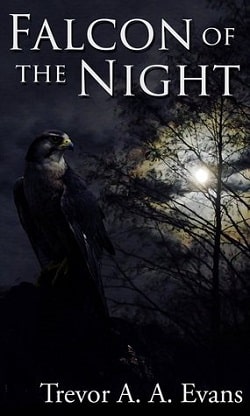Falcon of the Night by Trevor A. A. Evans is a gripping tale that plunges readers into the depths of despair and the flickering hope that can arise even in the darkest of circumstances. Set against the backdrop of Lyndwald, a serene lakeside city in the Northern Kingdom, the story unfolds in a world where the tranquility of the setting starkly contrasts with the turmoil faced by the protagonist, Liam. Captured and imprisoned, Liam's plight is a poignant exploration of resilience, betrayal, and the quest for redemption.
The narrative begins with Liam's dire situation—imprisoned in a tower, facing torture and execution at dawn. This immediate sense of urgency grips the reader, establishing a tone of suspense that permeates the entire novel. The revelation of Karsa, Liam's mentor, having taken his own life in a nearby cell adds layers of complexity to the story. Karsa's death serves as a catalyst for Liam's transformation, pushing him from a state of hopelessness to one of determination as he discovers Karsa's journal. This journal becomes not just a means of escape but a vessel of wisdom and guidance that propels Liam on a journey of self-discovery and empowerment.
One of the most striking aspects of Evans' writing is his ability to create a rich, immersive atmosphere. The descriptions of Lyndwald, with its serene lakes and towering structures, evoke a sense of place that is both beautiful and haunting. The contrast between the idyllic setting and the grim reality of Liam's imprisonment serves to heighten the emotional stakes of the story. Evans skillfully uses this juxtaposition to explore themes of freedom and confinement, both physical and psychological.
Character development is another strong suit of Falcon of the Night. Liam is a well-crafted protagonist whose evolution is both believable and compelling. Initially portrayed as a defeated and broken man, his character arc is one of gradual awakening. The journal serves as a mirror reflecting Karsa's wisdom and experiences, allowing Liam to confront his own fears and insecurities. As he delves deeper into the journal, he begins to uncover not only Karsa's past but also the strength within himself. This journey of self-realization is beautifully rendered, making Liam a relatable and sympathetic character.
Moreover, the relationship between Liam and Karsa is intricately woven into the narrative. Karsa's influence looms large over Liam's journey, even after his death. The journal acts as a bridge between the two, allowing Karsa's voice to resonate throughout the story. This dynamic adds emotional depth, as readers witness Liam grappling with feelings of guilt, loss, and ultimately, the desire to honor his mentor's legacy. The exploration of mentorship and the impact of loss is a poignant theme that resonates deeply, making the reader reflect on their own relationships and the legacies they inherit.
The pacing of the novel is expertly handled, with tension building steadily as Liam navigates his precarious situation. Evans masterfully balances moments of introspection with action, ensuring that the reader remains engaged throughout. The stakes are continually raised, leading to a climax that is both thrilling and emotionally satisfying. The resolution of Liam's journey is not just about physical escape but also about finding inner strength and purpose, making the conclusion feel earned and impactful.
In terms of thematic exploration, Falcon of the Night delves into the complexities of human emotion—fear, hope, despair, and resilience. The notion of finding light in darkness is a recurring motif, reminding readers that even in the bleakest of situations, there exists the potential for growth and transformation. This theme is reminiscent of works like The Count of Monte Cristo by Alexandre Dumas, where the protagonist's journey from despair to empowerment is central to the narrative. However, Evans' approach is uniquely modern, infusing the story with psychological depth and a focus on mentorship that sets it apart.
Furthermore, the book raises questions about the nature of sacrifice and the burdens of legacy. Karsa's decision to end his life casts a long shadow over Liam's journey, prompting readers to consider the weight of choices and the impact they have on those left behind. This exploration of sacrifice adds a layer of moral complexity to the narrative, inviting readers to reflect on their own values and the sacrifices they are willing to make for those they care about.
Overall, Falcon of the Night is a powerful and thought-provoking read that combines elements of suspense, character development, and thematic depth. Trevor A. A. Evans has crafted a story that not only entertains but also resonates on a deeper level, encouraging readers to reflect on their own lives and the legacies they create. With its rich atmosphere, compelling characters, and profound themes, this novel is sure to leave a lasting impression.
For those who enjoy stories of resilience and self-discovery, Falcon of the Night is a must-read. It stands as a testament to the strength of the human spirit and the enduring power of hope, making it a valuable addition to the literary landscape.
























Reviews 0
Post a Reviews: